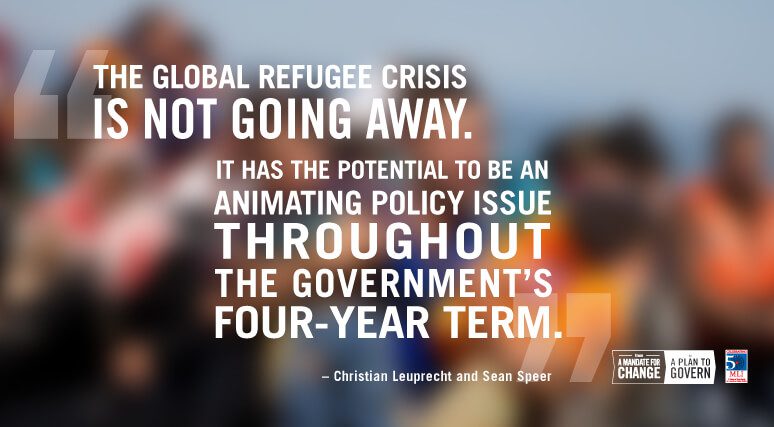
Latest installment of the Macdonald-Laurier Institute’s Mandate For Change series calls for a move beyond ad hoc promises to a coherent, systematic plan
OTTAWA, Dec. 9, 2015 – The crisis in Syria has catapulted refugee policy to the top of the federal government’s agenda. How can the governing Liberals best balance compassion for victims of conflict with concerns for Canada’s security?
 Macdonald-Laurier Institute Senior Fellows Christian Leuprecht and Sean Speer, in a new commentary paper, lay the groundwork for an effective long-term refugee resettlement policy.
Macdonald-Laurier Institute Senior Fellows Christian Leuprecht and Sean Speer, in a new commentary paper, lay the groundwork for an effective long-term refugee resettlement policy.
“The global refugee crisis is not going away”, write Leuprecht and Speer. “It has the potential to be an animating policy issue throughout the government’s four-year term”.
The paper is the latest entry in “From A Mandate For Change To A Plan To Govern”. The series, which will publish weekly from the Throne Speech to the first budget next spring, is designed to offer practical policy recommendations that help the newly-elected government follow through on its election promises.
To read the full commentary, click here.
Good first steps
Canadians should applaud the governing Liberals’ initial steps when it comes to refugees, write Leuprecht and Speer.
“The global refugee crisis is not going away”
The promise to immediately resettle 25,000 refugees builds, in the short-term, on Canada’s recent history of admitting victims of conflict. Over the long-term, the new government has expressed a willingness to “get it right” when it comes to refugee policy.
That’s where the Macdonald-Laurier Institute comes in.
 A refugee policy for the 21st century
A refugee policy for the 21st century
There are limits on what we can learn from the past given the magnitude of the current refugee crisis, write Leuprecht and Speer. The government will need to adopt new strategies for screening and integration that reflect the unique nature of current conflicts. But the following three principles should guide Canada’s new refugee policies.
- Consult with provincial and local governments on available resources in a bottom-up process to develop the national refugee resettlement target: The target for refugees should be a result of local capacity, not an arbitrary number the federal government floats to the rest of the country.
- Consult with private refugee sponsors: Research by the Department of Citizenship and Immigration shows that privately-sponsored refugees integrate better into Canada and have more success, and therefore the goal should be to enable more privately-sponsored refugees.
- Support states that are bearing the brunt of the refugee crisis: Asylum seekers cannot easily migrate to Canada and, in many cases, don’t even want to. Canada should offer greater financial support to help countries such as Jordan, Lebanon and Iraq that are on the front lines of the refugee crisis.
***
Christian Leuprecht is Associate Dean of the Faculty of Arts and Associate Professor in the Department of Political Science and Economics at the Royal Military College of Canada, and cross-appointed to the Department of Political Studies and the School of Policy Studies at Queen’s University. He is a Senior Fellow with the Macdonald-Laurier Institute.
Sean Speer is a Senior Fellow at the Macdonald-Laurier Institute. He previously served in different roles for the federal government including as senior economic advisor to the Prime Minister and director of policy to the Minister of Finance.
The Macdonald-Laurier Institute is the only non-partisan, independent national public policy think tank in Ottawa focusing on the full range of issues that fall under the jurisdiction of the federal government. Join us in 2015 as we celebrate our 5th anniversary.
For more information, please contact Mark Brownlee, communications manager, at 613-482-8327 x105 or email at mark.brownlee@macdonaldlaurier.ca.

 A refugee policy for the 21st century
A refugee policy for the 21st century


